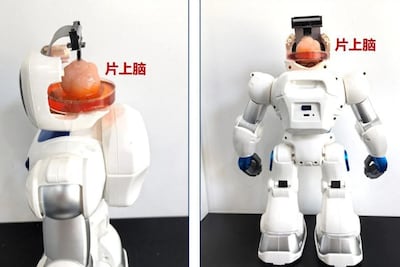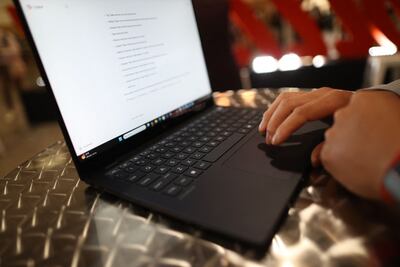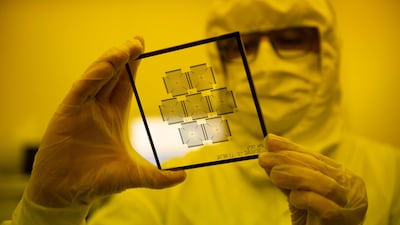The media talks perhaps too often about science fiction becoming scientific fact, but such discussion may be justified when it comes to recent work in China.
Researchers at Tianjin University created a robot – compared in one report to Frankenstein’s monster – that had a brain-like control centre made from a clump of nerve cells or neurons cultured in a laboratory.
This ambitious fusion of electronics and biology is one of the latest inventions in the brave new world of biocomputing.
According to a recent report by the UK-based Nuffield Council on Bioethics, technologists are increasingly looking to develop devices where organoids – tiny, lab-grown organs – are connected to sensors and output mechanisms and that, like the Tianjin robot, respond to electrical stimulation and carry out tasks.
Artificial brains in laptops?
The field of biocomputing involves much more than sci-fi robots, as clusters of neurons may have the potential to be used within computers of the kind that most of us have.
Brain organoids –tiny brain-like bundles of neurons – are typically generated from stem cells, just as tiny kidney or lung organoids have been for many years, often because they are useful research tools.
According to Dr Michael Barros, a lecturer in AI and engineering in medicine at the University of Essex in the UK, it is "absolutely" possible that even consumer electronics could in future have real neurological material embedded within them.
"It comes with a bit of a challenge because we now have to make living organisms survive alone or by themselves or have the necessary environment to do their job," he said.
"You need to keep cells alive and have a specific infrastructure for that and we have companies that are thinking about this problem."
The cells could be contained within a structure that provides them with a stable environment and protects them from the conditions of the outer environment, which may alter.
Biological material does not live for ever, so another consideration would be ensuring that the limited lifespan of the cells did not render useless the device that they were part of.
"The best estimate is that these biocomputers can live up to 200 days, so you can ... plan to replace biocomputing units every so often. That will be part of the cost of operating this sort of infrastructure," Dr Barros said.
"In our lab we’re also interested in reliability. If we’re operating with a biological system, it tends to change over time. How can we ensure that doesn’t happen or that if it does happen, it doesn’t affect the computing task?"
Replacing the trusty computer chip
A key question is why manufacturers might want to use biological material within their computers. Why not just perfect the standard silicon-chip-based device?
Andrew Jackson, a professor neural interfaces at Newcastle University in the UK, said that the answer lay in efficiency.
"In what ways are our brains better than artificial neural networks?" he said. "One of the things that our brains are very good at is performing computations, but doing it in a very power-efficient way compared to the power required to run computer-based AI systems.
" … Presumably our brains have evolved over millions of years to be very efficient information processors. One potentially interesting thing is whether we could devise artificial intelligence systems that are much more power-efficient if we leverage the principles of biology and neuroscience."
Not all researchers are convinced that brain organoids could eventually find their way into routine use in consumer electronics.
Instead, an alternative role for them may be in helping people to better understand how actual brains work, as this could lead to the creation of more efficient computers that mimic the properties of biological material.
"I would say that creating an architecture that’s more brain-like is the more likely outcome than something that mixes a cell culture and a computer," said Prof Thomas Hartung, of the Centre for Alternatives to Animal Testing at the John Hopkins Bloomberg School of Public Health in the United States.
Most of the activities with brain organoids that Prof Hartung is involved with are, he said, "virtual experiments" in which the organoid may be playing a computer game.
One possible scenario that could be seen over time is that brain organoids, potentially trained using artificial intelligence, become used within supercomputers.
This could cut the electricity demands of today’s large-scale devices, which consume vastly more energy for a given level of computing power than the human brain.
Advancing healthcare
Separate to biocomputing, brain organoids could prove useful for understanding neurodevelopmental conditions, such as autism, or neurodegenerative diseases such as Parkinson’s.
As brain organoids become more complex, ethical issues may become more prominent, although some may consider these to be dwarfed in importance by concerns over the use in laboratory experiments of more than 115 million live animals each year, according to the Humane Society International.
Prof Hartung said that brain organoid technology was "very far away" from creating a system with properties such as self-awareness or the ability to experience suffering.
In his work the brain organoids are less than half a millimetres in diameter and have fewer neurological cells than a housefly. Typically, they may consist of tens of thousands of neurons, while a human brain has tens of billions.
Nevertheless, he said that ethicists visit his facility to discuss the work and he said that it was important to consider formulating an ethical framework around what takes place while the technology is at an early stage.
"We’re having these discussions now [so] we’re coming to something where we should say there should be a limit," he said.
Prof Søren Holm, who researches bioethical issues at the University of Manchester in the UK and the University of Oslo in Norway, said that current neural technologies were not "anywhere near" the point at which organoids could develop sentience – the ability to feel things positively or negatively – or consciousness, which would enable them to not just feel pain, but understand what they were feeling.
"They’re simply not large enough or complex enough," said Prof Holm, who is a former editor-in-chief of the Journal of Medical Ethics.
"They’re order of magnitude smaller than the simplest mammalian brain. We don’t have any reason to believe the organoids we create now would have anything like sentience or consciousness."
A key technical hurdle, he said, is that organoids do not have a blood supply, which significantly limits their size and, therefore, their capabilities.
Even if they could grow to a level of complexity in which they were sentient or conscious, he said it would be "in a quite different way" to the consciousness that we experience.
"Sentience and consciousness in organoids is a very interesting question, but with what we can do with organoids now, it is not something that, for instance, a regulator needs to think about, because it’s not [for] the near future," he said.
"I would take a fairly large bet we’re not going to see sentience or consciousness in organoids for the next 20 years."
How to wear a kandura
Dos
- Wear the right fabric for the right season and occasion
- Always ask for the dress code if you don’t know
- Wear a white kandura, white ghutra / shemagh (headwear) and black shoes for work
- Wear 100 per cent cotton under the kandura as most fabrics are polyester
Don’ts
- Wear hamdania for work, always wear a ghutra and agal
- Buy a kandura only based on how it feels; ask questions about the fabric and understand what you are buying
Company profile
Name: Thndr
Started: October 2020
Founders: Ahmad Hammouda and Seif Amr
Based: Cairo, Egypt
Sector: FinTech
Initial investment: pre-seed of $800,000
Funding stage: series A; $20 million
Investors: Tiger Global, Beco Capital, Prosus Ventures, Y Combinator, Global Ventures, Abdul Latif Jameel, Endure Capital, 4DX Ventures, Plus VC, Rabacap and MSA Capital
Difference between fractional ownership and timeshare
Although similar in its appearance, the concept of a fractional title deed is unlike that of a timeshare, which usually involves multiple investors buying “time” in a property whereby the owner has the right to occupation for a specified period of time in any year, as opposed to the actual real estate, said John Peacock, Head of Indirect Tax and Conveyancing, BSA Ahmad Bin Hezeem & Associates, a law firm.
Company%20profile
%3Cp%3E%3Cstrong%3EName%3A%3C%2Fstrong%3E%20JustClean%3Cbr%3E%3Cbr%3E%3Cstrong%3EBased%3A%20%3C%2Fstrong%3EDubai%20with%20offices%20in%20other%20GCC%20countries%3Cbr%3E%3Cbr%3E%3Cstrong%3ELaunch%20year%3A%3C%2Fstrong%3E%202016%3Cbr%3E%3Cbr%3E%3Cstrong%3ENumber%20of%20employees%3A%3C%2Fstrong%3E%20160%2B%20with%2021%20nationalities%20in%20eight%20cities%3Cbr%3E%3Cstrong%3E%3Cbr%3ESector%3A%3C%2Fstrong%3E%20online%20laundry%20and%20cleaning%20services%3Cbr%3E%3Cbr%3E%3Cstrong%3EFunding%3A%20%3C%2Fstrong%3E%2430m%20from%20Kuwait-based%20Faith%20Capital%20Holding%20and%20Gulf%20Investment%20Corporation%3C%2Fp%3E%0A
The%20specs
%3Cp%3E%3Cstrong%3EEngine%3A%3C%2Fstrong%3E%201.8-litre%204-cyl%20turbo%0D%3Cbr%3E%3Cstrong%3EPower%3A%20%3C%2Fstrong%3E190hp%20at%205%2C200rpm%0D%3Cbr%3E%3Cstrong%3ETorque%3A%3C%2Fstrong%3E%20320Nm%20from%201%2C800-5%2C000rpm%0D%3Cbr%3E%3Cstrong%3ETransmission%3A%20%3C%2Fstrong%3ESeven-speed%20dual-clutch%20auto%0D%3Cbr%3E%3Cstrong%3EFuel%20consumption%3A%3C%2Fstrong%3E%206.7L%2F100km%0D%3Cbr%3E%3Cstrong%3EPrice%3A%3C%2Fstrong%3E%20From%20Dh111%2C195%0D%3Cbr%3E%3Cstrong%3EOn%20sale%3A%20%3C%2Fstrong%3ENow%3C%2Fp%3E%0A
Red flags
- Promises of high, fixed or 'guaranteed' returns.
- Unregulated structured products or complex investments often used to bypass traditional safeguards.
- Lack of clear information, vague language, no access to audited financials.
- Overseas companies targeting investors in other jurisdictions - this can make legal recovery difficult.
- Hard-selling tactics - creating urgency, offering 'exclusive' deals.
Courtesy: Carol Glynn, founder of Conscious Finance Coaching
Day 2, stumps
Pakistan 482
Australia 30/0 (13 ov)
Australia trail by 452 runs with 10 wickets remaining in the innings
Why it pays to compare
A comparison of sending Dh20,000 from the UAE using two different routes at the same time - the first direct from a UAE bank to a bank in Germany, and the second from the same UAE bank via an online platform to Germany - found key differences in cost and speed. The transfers were both initiated on January 30.
Route 1: bank transfer
The UAE bank charged Dh152.25 for the Dh20,000 transfer. On top of that, their exchange rate margin added a difference of around Dh415, compared with the mid-market rate.
Total cost: Dh567.25 - around 2.9 per cent of the total amount
Total received: €4,670.30
Route 2: online platform
The UAE bank’s charge for sending Dh20,000 to a UK dirham-denominated account was Dh2.10. The exchange rate margin cost was Dh60, plus a Dh12 fee.
Total cost: Dh74.10, around 0.4 per cent of the transaction
Total received: €4,756
The UAE bank transfer was far quicker – around two to three working days, while the online platform took around four to five days, but was considerably cheaper. In the online platform transfer, the funds were also exposed to currency risk during the period it took for them to arrive.
First Person
Richard Flanagan
Chatto & Windus
Zayed Sustainability Prize
The bio
Favourite book: Peter Rabbit. I used to read it to my three children and still read it myself. If I am feeling down it brings back good memories.
Best thing about your job: Getting to help people. My mum always told me never to pass up an opportunity to do a good deed.
Best part of life in the UAE: The weather. The constant sunshine is amazing and there is always something to do, you have so many options when it comes to how to spend your day.
Favourite holiday destination: Malaysia. I went there for my honeymoon and ended up volunteering to teach local children for a few hours each day. It is such a special place and I plan to retire there one day.
UAE currency: the story behind the money in your pockets
TOP%2010%20MOST%20POLLUTED%20CITIES
%3Cp%3E1.%20Bhiwadi%2C%20India%0D%3Cbr%3E2.%20Ghaziabad%2C%20India%0D%3Cbr%3E3.%20Hotan%2C%20China%0D%3Cbr%3E4.%20Delhi%2C%20India%0D%3Cbr%3E5.%20Jaunpur%2C%20India%0D%3Cbr%3E6.%20Faisalabad%2C%20Pakistan%0D%3Cbr%3E7.%20Noida%2C%20India%0D%3Cbr%3E8.%20Bahawalpur%2C%20Pakistan%0D%3Cbr%3E9.%20Peshawar%2C%20Pakistan%0D%3Cbr%3E10.%20Bagpat%2C%20India%3C%2Fp%3E%0A%3Cp%3E%3Cem%3ESource%3A%20IQAir%3C%2Fem%3E%3C%2Fp%3E%0A
Mohammed bin Zayed Majlis
War 2
Director: Ayan Mukerji
Stars: Hrithik Roshan, NTR, Kiara Advani, Ashutosh Rana
Rating: 2/5
The Old Slave and the Mastiff
Patrick Chamoiseau
Translated from the French and Creole by Linda Coverdale
Karwaan
Producer: Ronnie Screwvala
Director: Akarsh Khurana
Starring: Irrfan Khan, Dulquer Salmaan, Mithila Palkar
Rating: 4/5
Our family matters legal consultant
Name: Hassan Mohsen Elhais
Position: legal consultant with Al Rowaad Advocates and Legal Consultants.
Surianah's top five jazz artists
Billie Holliday: for the burn and also the way she told stories.
Thelonius Monk: for his earnestness.
Duke Ellington: for his edge and spirituality.
Louis Armstrong: his legacy is undeniable. He is considered as one of the most revolutionary and influential musicians.
Terence Blanchard: very political - a lot of jazz musicians are making protest music right now.
Signs%20of%20%20%20%20%20%20%20heat%20stroke
%3Cul%3E%0A%3Cli%3EThe%20loss%20of%20sodium%20chloride%20in%20our%20sweat%20can%20lead%20to%20confusion%20and%20an%20altered%20mental%20status%20and%20slurred%20speech%3C%2Fli%3E%0A%3Cli%3EBody%20temperature%20above%2039%C2%B0C%3C%2Fli%3E%0A%3Cli%3EHot%2C%20dry%20and%20red%20or%20damp%20skin%20can%20indicate%20heatstroke%3C%2Fli%3E%0A%3Cli%3EA%20faster%20pulse%20than%20usual%3C%2Fli%3E%0A%3Cli%3EDizziness%2C%20nausea%20and%20headaches%20are%20also%20signs%20of%20overheating%3C%2Fli%3E%0A%3Cli%3EIn%20extreme%20cases%2C%20victims%20can%20lose%20consciousness%20and%20require%20immediate%20medical%20attention%3C%2Fli%3E%0A%3C%2Ful%3E%0A
The biog
Age: 23
Occupation: Founder of the Studio, formerly an analyst at Cleveland Clinic Abu Dhabi
Education: Bachelor of science in industrial engineering
Favourite hobby: playing the piano
Favourite quote: "There is a key to every door and a dawn to every dark night"
Family: Married and with a daughter
UAE currency: the story behind the money in your pockets
Start times
5.55am: Wheelchair Marathon Elites
6am: Marathon Elites
7am: Marathon Masses
9am: 10Km Road Race
11am: 4Km Fun Run
Anghami
Started: December 2011
Co-founders: Elie Habib, Eddy Maroun
Based: Beirut and Dubai
Sector: Entertainment
Size: 85 employees
Stage: Series C
Investors: MEVP, du, Mobily, MBC, Samena Capital
Afro%20salons
%3Cp%3E%3Cstrong%3EFor%20women%3A%3C%2Fstrong%3E%3Cbr%3ESisu%20Hair%20Salon%2C%20Jumeirah%201%2C%20Dubai%3Cbr%3EBoho%20Salon%2C%20Al%20Barsha%20South%2C%20Dubai%3Cbr%3EMoonlight%2C%20Al%20Falah%20Street%2C%20Abu%20Dhabi%3Cbr%3E%3Cstrong%3EFor%20men%3A%3C%2Fstrong%3E%3Cbr%3EMK%20Barbershop%2C%20Dar%20Al%20Wasl%20Mall%2C%20Dubai%3Cbr%3ERegency%20Saloon%2C%20Al%20Zahiyah%2C%20Abu%20Dhabi%3Cbr%3EUptown%20Barbershop%2C%20Al%20Nasseriya%2C%20Sharjah%3C%2Fp%3E%0A
Yahya Al Ghassani's bio
Date of birth: April 18, 1998
Playing position: Winger
Clubs: 2015-2017 – Al Ahli Dubai; March-June 2018 – Paris FC; August – Al Wahda




